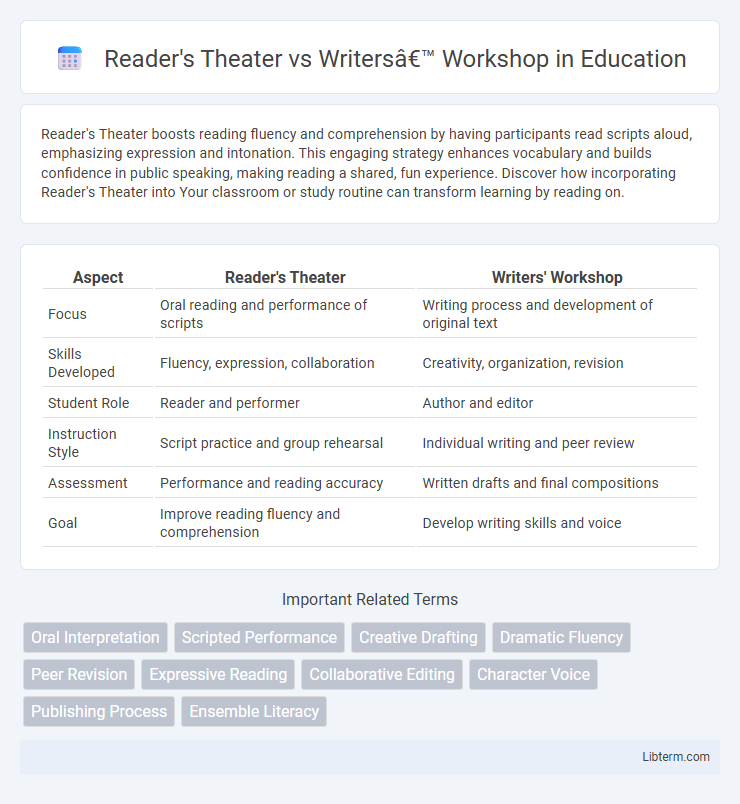Reader's Theater boosts reading fluency and comprehension by having participants read scripts aloud, emphasizing expression and intonation. This engaging strategy enhances vocabulary and builds confidence in public speaking, making reading a shared, fun experience. Discover how incorporating Reader's Theater into Your classroom or study routine can transform learning by reading on.
Table of Comparison
| Aspect | Reader's Theater | Writers' Workshop |
|---|---|---|
| Focus | Oral reading and performance of scripts | Writing process and development of original text |
| Skills Developed | Fluency, expression, collaboration | Creativity, organization, revision |
| Student Role | Reader and performer | Author and editor |
| Instruction Style | Script practice and group rehearsal | Individual writing and peer review |
| Assessment | Performance and reading accuracy | Written drafts and final compositions |
| Goal | Improve reading fluency and comprehension | Develop writing skills and voice |
Introduction to Reader's Theater and Writers’ Workshop
Reader's Theater immerses students in performance-based reading, enhancing fluency and expression through engaging scripts. Writers' Workshop emphasizes a process-driven approach, guiding participants through stages of brainstorming, drafting, revising, and publishing original written work. Both methods foster literacy skills, with Reader's Theater improving oral reading proficiency and Writers' Workshop cultivating writing development.
Defining Reader’s Theater: Key Characteristics
Reader's Theater is a performance-based approach where participants read scripts aloud, emphasizing expressive vocal delivery and character interpretation without memorization or elaborate staging. This method enhances fluency, comprehension, and engagement by focusing on repeated reading and collaborative expression. Unlike Writers' Workshop, which centers on creating and refining original texts, Reader's Theater prioritizes oral reading skills and interpretive performance to build literacy development.
Understanding Writers’ Workshop: Core Elements
Writers' Workshop centers on developing writing skills through stages like brainstorming, drafting, revising, and publishing, emphasizing individual expression and feedback. It fosters a supportive environment where students actively engage in peer review and teacher conferences, enhancing their narrative and expository writing abilities. This structured approach contrasts with Reader's Theater, which focuses primarily on reading fluency and oral interpretation of texts.
Objectives: Performance vs. Process
Reader's Theater emphasizes performance objectives by engaging students in expressive reading and oral interpretation to enhance fluency, comprehension, and confidence. Writers' Workshop centers on the writing process, focusing on drafting, revising, and sharing original compositions to develop creativity, organization, and editing skills. These distinct approaches prioritize either the oral performance of text or the iterative process of writing to meet diverse literacy learning goals.
Skill Development: Oral Fluency vs. Writing Craft
Reader's Theater enhances oral fluency by engaging students in expressive reading, pronunciation, and intonation practice, which improves communication skills and confidence. Writers' Workshop focuses on writing craft by providing structured opportunities for drafting, revising, and editing, fostering creativity and mastery of grammar, syntax, and organization. Both approaches complement each other by targeting distinct skill sets essential for comprehensive literacy development.
Classroom Implementation Strategies
Reader's Theater enhances fluency and comprehension through scripted performance, encouraging expressiveness and collaboration among students. Writers' Workshop focuses on individual writing development with structured stages like drafting, revising, and sharing, supported by teacher conferences and peer feedback. Effective classroom implementation blends Reader's Theater to boost oral skills and Writers' Workshop to strengthen writing proficiency, fostering a balanced literacy environment.
Student Engagement and Participation
Reader's Theater promotes high student engagement through active oral reading and collaborative performance, encouraging expressive skills and peer interaction. Writers' Workshop fosters student participation by providing opportunities for creative writing, peer feedback, and revision, enhancing ownership and motivation in the writing process. Both approaches support differentiated learning, but Reader's Theater emphasizes spoken language fluency, while Writers' Workshop focuses on individual expression and composition development.
Assessment and Feedback Approaches
Reader's Theater emphasizes performance-based assessment, where oral expression, fluency, and comprehension are evaluated through live presentations, providing immediate, peer, and instructor feedback focused on delivery and interpretation skills. Writers' Workshop centers on formative assessment through writing conferences and peer reviews, offering detailed, individualized feedback to improve drafting, revision, and editing processes. Both approaches utilize qualitative feedback but differ in modality--Reader's Theater assesses verbal communication, while Writers' Workshop prioritizes written expression.
Integrating Both Approaches in the Curriculum
Integrating Reader's Theater and Writers' Workshop in the curriculum enhances literacy by combining oral fluency and creative writing skills, fostering comprehensive language development. Reader's Theater promotes engagement through performance and repeated reading, while Writers' Workshop encourages original composition and revision, enabling students to connect reading and writing processes. This dual approach supports differentiated learning, allowing educators to address diverse student needs and build confidence in both expression and comprehension.
Conclusion: Choosing the Best Approach for Your Students
Selecting the best approach for students depends on their individual learning needs and goals; Reader's Theater enhances comprehension and oral fluency through performance, while Writers' Workshop fosters creativity and writing skills through structured feedback. Integrating both methods can provide a balanced literacy experience by encouraging expressive reading and effective writing development. Educators should assess their students' strengths and areas for growth to tailor instruction that maximizes engagement and skill acquisition.
Reader's Theater Infographic

 libterm.com
libterm.com